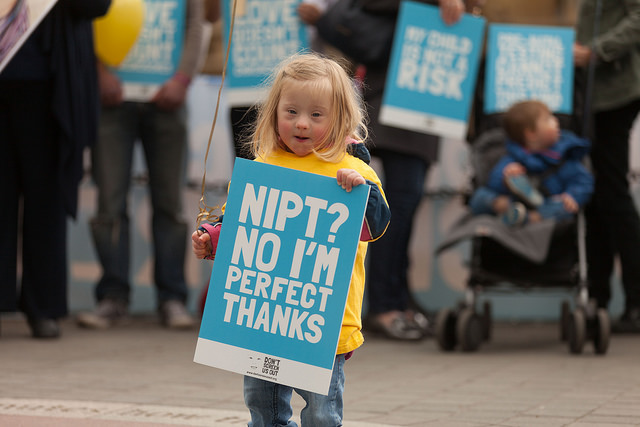People with Down’s syndrome, their families and advocacy groups are concerned that the 2016 abortion statistics released today show an increase in the number of abortions for Down’s syndrome.
The statistics show an increase from 689 abortions for Down’s Syndrome in 2015 to 706 in 2016. This represents a 46% increase in terminations since 2010. This is likely to be due to the private availability of cfDNA testing (otherwise known as NIPT) which has already been blamed for an increase in numbers of children with Down’s syndrome screened out by termination. The beginning of the roll-out of these tests on the NHS, who are also recommending the private tests to expectant mothers, may also be starting to have an impact on the number of terminations.
This situation is set to get far worse as the Government moves ahead with proposals to implement cfDNA testing into the Fetal Anomaly Screening Programme.
Proponents of the test have glossed over the fact that a a National Screening Committee pilot study predicts the new screening will detect 102 more babies with Down’s syndrome every year. Based on the current 90% of pregnancies that are aborted following a diagnosis, this would mean an increase of 92 abortions for Down’s syndrome annually.
That reduction equates to an overall decline of Down’s syndrome live births by 13% and would lead to a corresponding reduction in the number of people with the condition in the UK. Such an outcome is likely to have a profoundly negative impact on the community of people with Down’s Syndrome.
The Don’t Screen Us Out campaign, a coalition of Down’s syndrome advocacy groups, are urging Health Secretary Jeremy Hunt to delay the implementation of the new test until there has been full consultation with the community of people with Down’s syndrome and medical reforms have been introduced which provide greater support for parents who have received a pre-natal diagnosis of Down’s syndrome.
Lynn Murray, spokeswoman for the Don’t Screen Us Out campaign said:
“As mother of a daughter who has Down’s syndrome it is deeply concerning to see that the number of abortions for Down’s syndrome have again increased. Sadly this is the tip of the iceberg – when the Government follows through on proposals to make these tests available on the NHS, their own projections show that there will be a steep increase in the numbers of children with Down’s syndrome screened out by termination.”
ENDS
For more information on the Don’t Screen Us Out campaign, see our website www.dontscreenusout.org or email info@dontscreenusout.org
For interviews, phone Don’t Screen Us Out spokeswomen:
Lynn Murray – info@dontscreenusout.org
For a full list of previous coverage on this issue see our website – www.dontscreenusout.org



